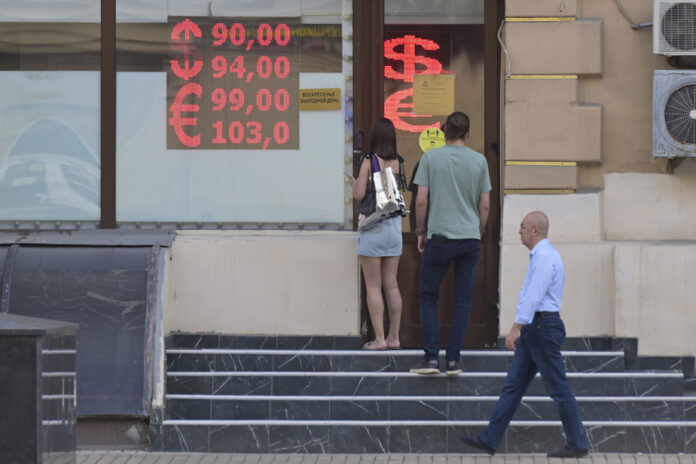(Moscow) Vladimir Putin said Tuesday that he did not see “insurmountable problems” in the weakening of the ruble for weeks against the dollar and the euro, despite the efforts of the Russian Central Bank.
“Overall, I don’t think there are any absolutely insurmountable problems or difficulties,” Putin said at the plenary session of the Eastern Economic Forum being held in Vladivostok (Russia’s Far East).
The weakening of the ruble at the beginning of August, however, pushed the Russian Central Bank to urgently raise its key rate from 8.5% to 12%, a means of combating inflation and the volatility of the national currency. And it could decide on a new increase at the end of the week.
At that time, it was necessary to pay 100 rubles to obtain a dollar and 109 for a euro, exchange rates more observed since the very beginning of the Russian offensive in Ukraine and the cascade of the first sanctions in the first quarter of 2022 which had affected the Russian economy.
But the effect was only short-lived: On Tuesday morning, it took 95 and 101.9 rubles to buy a dollar and a euro, respectively.
One of the main causes of the fall of the national currency is the state of foreign trade.
Russia is suffering in particular from the considerable drop in revenues linked to the sale of its hydrocarbons, under the effect of sanctions and the determination of Europeans to end their energy dependence on Moscow.
According to Vladimir Putin, the situation is also linked to “the non-return of part of the foreign exchange earnings of our largest exporters,” he said on Tuesday.
Indeed, according to the Russian authorities, some of the main national exporters store dollars and other currencies from their revenues abroad, without converting them by repatriating them to Russia, meaning that these revenues do not enter the national economy. .
And “imports are coming to our market in increasingly larger volumes” compared to 2022, he noted, “which means that foreign currencies are increasingly in demand,” automatically weakening the ruble.
At the national level, the authorities are finally worried about the emergence of a speculative bubble driven by too large a volume of credit, also fueling the rise in prices.
On Tuesday, Mr. Putin called on the authorities to “mitigate these risks” in the face of “rapid growth in consumer loans.”















